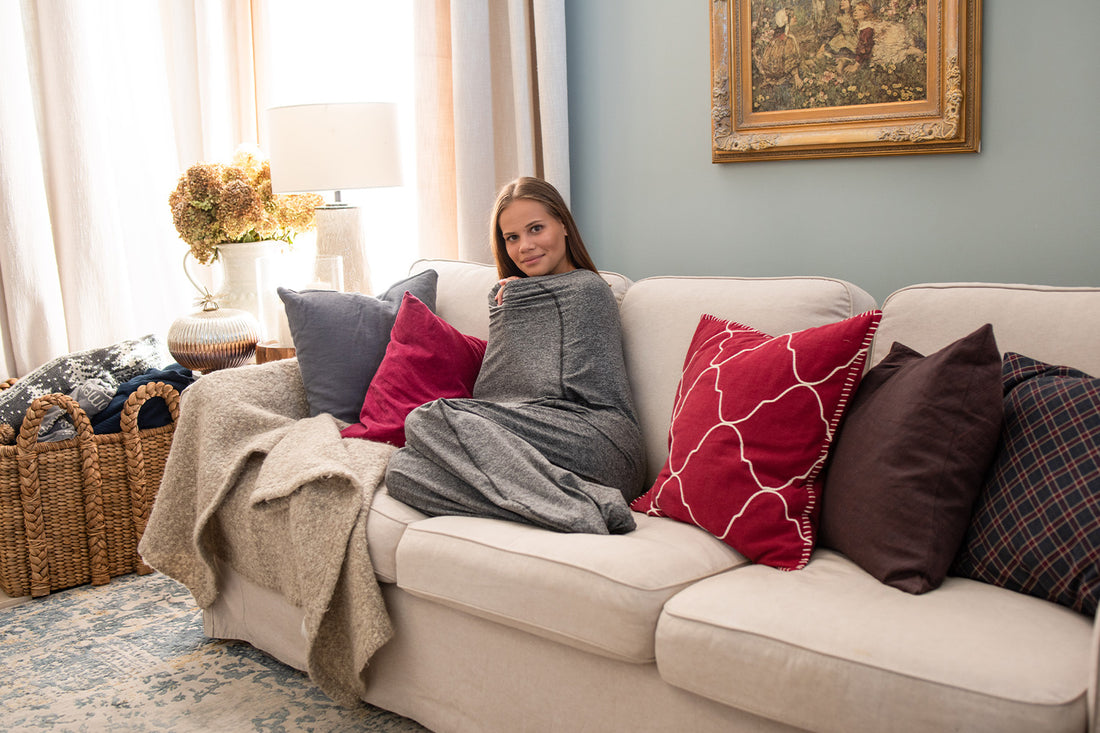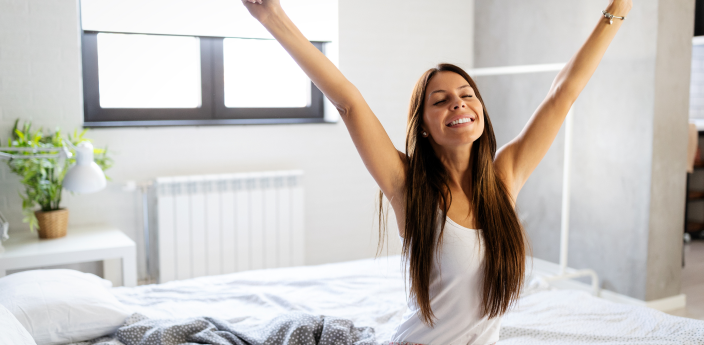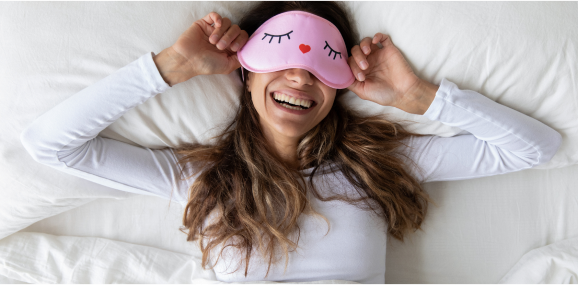Some people really love their midday naps. You probably have a nap champion in your life, or you might be the nap champion of your family.
Believe it or not, many proud nappers are on the right track. The occasional nap, when used appropriately, may be beneficial to you. Why you nap and how you nap are the two most important factors in determining whether or not your nap is actually helpful.
Here’s what you need to know about naps, including how to nap like a pro.
First of All, Why Are You Napping?
Before we get into all the information about how great a nap could be, there’s a really important thing to establish first. If you’re napping because you didn’t sleep well, a nap won’t fix the problem.
Are You Suddenly Developing a Nap Habit?
If your need for naps is new, it may be worth speaking to a doctor. If you’re still sleeping the same amount you always were and you can’t figure out why you’re suddenly exhausted after lunch, a doctor will be able to tell you if it’s something to be concerned about.
If you have insomnia and only nap when your body finally allows you to, these naps are a problem. They’re not on par with sleeping properly.
Some people experience a dip in their energy throughout the afternoon as they age into adulthood from young adulthood. It may be completely normal, but it helps to know exactly what’s going on.
You Need To Get Enough Sleep
High-quality sleep for a minimum of 7 hours every night is necessary for your wellbeing.
If you’re sleeping for less than 7 hours and trying to make up for it with a nap, you won’t experience any benefits.
A nap won’t be long enough for your body to enter a deep and restorative sleep state. It’s only enough to give you the little boost you need to drag your feet through the rest of your day.
If you’re sleeping 7 hours a night and you feel like your sleep is sufficient, try sleeping more. Up to 9 hours of sleep a night is normal. Increase your sleep by an hour a night and see if it curbs your urge to take a nap.
What To Do When You Have Problems Sleeping
If you’re napping because you’re having difficulty sleeping at night, you need to speak to your doctor. Many health conditions can lead to difficulty sleeping. Some habits, like excessive caffeine consumption, can also make it difficult to fall asleep at night. If you’re experiencing issues, a nap won’t fix it. The problem needs to be addressed adequately and immediately.
Are Naps Good for You?
Naps can be good for you, but they aren’t necessary or vital. Some people find that taking a nap helps them to increase their energy levels and mental alertness for a few hours. This is good for you if you have some things to do and need a little pick me up.
Naps also may be good for you if the alternative is coffee, tea, or an energy drink. The effects of caffeine can linger for hours, and if you drink caffeine too late in the day, it may keep you up at night. A short nap can naturally give your body’s battery a little charge without any lingering after-effects. In that scenario, napping is a much better choice than chugging an iced latte.
Is It Bad to Take a Nap Every Day?
If you feel the need to take a nap every day, something might be at play with your health or your sleep habits.
If your doctor says you’re in good health and you generally get a sufficient amount of high quality sleep every night, a short nap before you run out to grab dinner probably isn’t bad.
How Long Should a Nap Be?
Experts say that a 20-minute nap is the most ideal to get a quick recharge without falling into the depths of a sleep cycle, which is what causes you to feel groggy.
There’s a big difference between a 20 minute nap and an hour-long nap.
If you set your alarm to wake you up in an hour, you’re more likely to wake up groggy and out of sorts. Your body will attempt to go into a full sleep, and you’ll disrupt the process. When you wake up, you’ll experience something called sleep inertia. The effects can linger on for hours, if not for the rest of the day.
If your nap is only 20 minutes long, your body won’t have time to attempt to reach deeper sleep. It takes an hour or two for your body to reach REM sleep, which should only occur during your normal nighttime sleep. If you wake up long before you reach that point, you won’t carry around the fatigue and grogginess that comes as a result of disrupting the deepest part of your sleep cycle.
When Should You Take a Nap?
You don’t want to take a nap so late in the day that your nap will interfere with your body’s ability to put itself to sleep at night. If it’s after 3 PM, you might want to think twice about your nap. If you’re winding down after you’ve worked out and had lunch, a quick nap at 1:30 PM won’t significantly disturb your body’s rhythm.
If you’ve already had dinner and it’s dark outside, consider going to bed early and sleeping for a little longer. You can easily go to bed at 9 PM and wake up at 6 AM, giving you 9 hours of uninterrupted rest to recharge. A little extra nighttime sleep might be the answer.
What Are the Benefits of Napping?
Even if you slept well, there may be times where you still feel like you need a nap. This is normal on occasion, especially if you’ve been very physically or mentally active over the course of the day.
1. You’ll Relax
If your day has been stressful or busy, taking a nap is a great way to relax. Your brain uses the time when you’re sleeping to commit things to memory and process your emotions. Even a 15-minute nap may be enough to help you wipe the slate clean and come back more refreshed.
Bonus points if you can squeeze in a 15 minute meditation session before your nap. The two can work together to improve the way you feel.
2. You’ll Take the Edge off Your Fatigue
Some people find that their energy levels go down in the middle of the day. Riding it out may work, but you might feel like you’re dragging your feet around for an hour or two while your body tried to find more energy. Caffeine can work, but it isn’t always the best choice. A nap is free, natural, and perfectly effective to help put some pep back in your step.
3. Your Mood Will Be Better
If your nap isn’t too long, you’ll wake up in a better mood. A quick nap can do a lot to reset the way you feel. Sometimes, a nap can be used as a mood management tool even if you aren’t necessarily tired. Think of a nap as your little do-over. You already woke up and things didn’t go exactly the way you wanted them to. With a nap, you get to wake up and try again.
4. You’ll Function Better
A short nap can help to improve your reaction time, boost your concentration, boost your alertness, and help your brain learn better. Try taking a nap before you study or tend to some of the work you brought home with you. You’ll be able to get your head back in the game and perform your best.
How To Take a Great Nap
A great nap can restore you and give you the extra boost you need to make it through the rest of your busy day. If you approach your nap haphazardly, you may inadvertently oversleep and wake up with a lingering case of sleep inertia.
If you get it down to a system, you’ll be able to master the art of the power nap every time you need a quick refuel.
Nap at the Right Time
Although many studies state that you shouldn’t nap after 3 PM, that may not be the best advice for you. You may have a different sleep schedule. If you work late shifts at work and sleep in until 10 AM or later, taking a nap at 4 PM is unlikely to cause significant disruption to your sleep rhythm.
Use your best judgment. If it’s still a few hours before you usually eat dinner, you’re probably in the clear.
Set an Alarm
One of the biggest mistakes that people make is laying down and saying “I’m just going to rest my eyes for a moment.” They often wake up two hours later completely out of sorts, running far behind on the rest of the things they needed to do that day.
If you’re going to take a nap, you need to set an alarm. It may take you a few minutes to fall asleep, so factor that into your nap time. If you want to take a 20 minute nap, set your alarm for 25 minutes from the time you lay down.
Get Your Room Dark and Cool
At night, your room is likely the ideal stage for sleep. During the day, you’re working against what your body naturally prefers in a sleeping environment. People sleep better in a dark and cool room. During the day, your room is likely flooded with sunlight and a little warmer.
Turn on a fan to promote air circulation and kick down the thermostat a couple of degrees. Pull your curtains closed, or use a sleep mask if the curtains are too light to substantially block out the sun.
Snuggle Up
Wrap yourself in a blanket that’s appropriate for the weather, or crawl into your Sleep Pod. The best way to take a nap is the same way you successfully fall asleep at night. If you use a condensed version of the same routine, your body is more likely to respond quickly and fall asleep sooner because it associates your actions with bedtime.
Don’t Hit Snooze
Even if your nap was really great, there’s no need for a repeat. Don’t hit snooze or turn your alarm off and go back to sleep — you’re likely to get hit with sleep inertia. If you sleep too long, you’re also likely to have difficulty sleeping at night.
After you turn your alarm off, sit right up to assure you won’t fall back to sleep. Within a minute or two, you’ll begin to feel the invigorating effects of your nap.
Make Sure You’re Sleeping Well at Night
Naps aren’t beneficial if you aren’t sleeping well at night. Your urge to frequently nap is better interpreted as your body crying out for help. It needs restful and restorative sleep, and it feels as though it isn’t getting enough. If you’re napping more than occasionally, it’s time to take another look at your bedtime routine.
Plan Your Bedtime
Your body needs 7 to 9 hours of sleep a night. Does your bedtime line up with your wake time? If you plan to go to bed at 10 PM, but then spend two hours getting ready for bed and setting up your morning routine, you’re actually going to bed at midnight. If your alarm is set for 6 AM, you’re not getting enough sleep.
Set a bedtime for yourself that’s firm, and make sure your head is on the pillow and your eyes are closed at that time.
Remove All Distractions
Watching TV, scrolling on your phone, or playing games is mentally stimulating. This can keep your brain from winding down.
Worse still, the blue light emitted by screens can confuse your body’s internal clock. It can’t distinguish artificial blue light from day light, and it may believe it isn’t yet time for bed. This can lead to a delay in the production of the hormones and special chemicals your body makes to get you ready for bed.
Get Comfortable
Make sure your room is at a comfortable temperature. Sleep on clean sheets that are appropriate for the weather. Use a mattress topper if you feel like you need a little more support or cushion when you’re laying down. Invest in your sleep. Even if it means buying a new bed, it’s worth it in the long run. Sleep is vital to your health.
Keep Yourself Calm and Relaxed
If you have a tough time sleeping at night and your doctor doesn’t believe the issue is medical in nature, you might be a little too wound up or restless.
The Hug Sleep Pod is designed to mimic the effects of deep pressure therapy. Deep pressure therapy uses soothing compression on the body to ease anxious feelings or emotional tension. It’s a lot like a gentle hug that encompasses your whole body.
If you need a little extra help feeling calm and secure at bedtime, snuggle up into a Sleep Pod. The gentle compression will hold you all night long.
The Final Verdict: Naps Are Sometimes Good for You
Naps are good for you when you occasionally need to refresh your mindset or get a little natural boost of energy. If naps are habitual and you feel as though they’re necessary for you to function, this is a sign that you need to speak to your doctor about ways to get more high quality sleep at night.
Sources
How Much Sleep Do We Really Need? | Sleep Foundation

































500,000+ happy customers